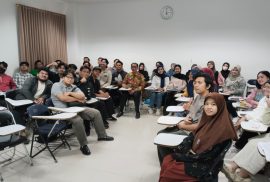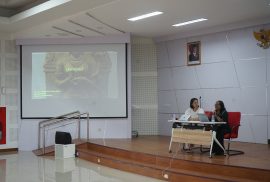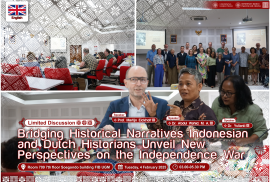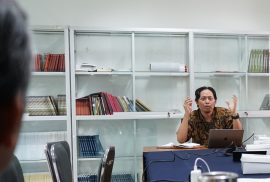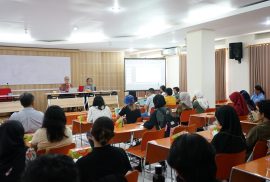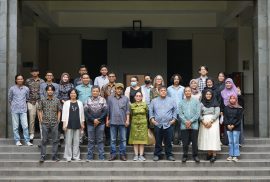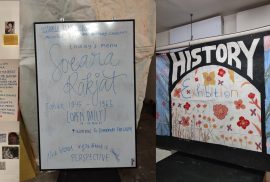On Friday, September 19, 2025, the Department of History at Universitas Gadjah Mada (UGM) welcomed a visit from Colonel Caj. Dr. Kusuma, M.Si., an alumnus of UGM’s undergraduate History program (class of 1992), who currently serves as a lecturer and Head of the Master’s Program in Disaster Management at the Faculty of National Security, Universitas Pertahanan. On this occasion, he delivered a guest lecture on “New Perspectives in Writing Military History Narratives” to undergraduate History students enrolled in the course Fundamentals of Historical Theory and Methodology.
news
Classroom 325 during its inaugural lecture for graduate students. Photo: Muhammad Fadhlan Hamidan
On Thursday, August 14, 2025, from 10:00 to 11:15 a.m. Western Indonesian Time, the Department of History successfully held its introductory lecture for graduate students. The lecture was attended not only by master’s students but also by 31 doctoral students.
The lecture was opened by Farabi Fakih, Head of the Graduate Study Program. It began with an introduction to the graduate program in the Department of History. This program included the course schedule, teaching staff, and extracurricular activities that graduate students could participate in, such as workshops, summer school, conferences, seminars, departmental internships, and others.
Hasna Fuadilla H. delivering her experiences during her study of History at Gadjah Mada University. Source: National Archives of the Republic of Indonesia (ANRI)
On July 11, 2025, from 9:00 a.m. to 12:00 p.m. Western Indonesian Time, the Department of History, in collaboration with the National Archives of the Republic of Indonesia (ANRI), held a socialization event entitled “Program Pascasarjana Ilmu Sejarah Fakultas Ilmu Budaya Universitas Gadjah Mada bagi Pegawai Arsip Nasional Republik Indonesia.” The event was attended by the Head of ANRI, Dr. Mego Pinandito; the Vice Dean for Academic and Student Affairs of the Faculty of Cultural Sciences, UGM, Dr. Nur Saktiningrum; and the Head of the Master of History Study Program, Dr. Farabi Fakih, as speakers.
Following the launching of the research project on Lombok Heritage, the Department of History, Universitas Gadjah Mada (UGM) hosted a public lecture titled “Beyond the Point of No Return: The Re-Emergence of Indonesian Debates and Concepts on the Return of Cultural Objects”. The public lecture was delivered by Dr. Sadiah Boonstra, a historian and curator, as well as the founder of CultureLab Consultancy. She is also one of the postdoctoral researchers within the Indonesia-Netherlands research consortium focused on the Lombok Heritage.
Image: Jaap Kunst’s Collection, Universiteit van Amsterdam, Olivier Middendorp.
We are delighted to announce that our collaborative research team at the Department of History, Faculty of Cultural Sciences, Universitas Gadjah Mada, and the Department of Musicology at the University of Amsterdam (UvA) has been awarded a significant grant from the Royal Dutch Research Council (NWO) under the Research into Collections with a Colonial Context program to support our research project, Restituting, Reconnecting, and Reimagining Sound Heritage (Re:Sound).
On Tuesday, February 4, 2025, a historical discussion was held in Room 709, 7th Floor, Soegondo Building, Faculty of Cultural Sciences, Gadjah Mada University. The event took place from 3:00 PM to 5:00 PM WIB and was attended by various academics and historical researchers, both from Indonesia and abroad, including research colleagues from the Netherlands who were on a journey retracing history following World War II in Indonesia.
The discussion was officially opened by Dr. Abdul Wahid, M.A., Head of the Department of History, Faculty of Cultural Sciences, UGM. In his opening remarks, he emphasized the importance of historical studies based on academic collaboration between Indonesia and the Netherlands to achieve a more comprehensive understanding of the decolonization period and its impact on both nations.
On Wednesday, February 22, 2023, the History Department of Universitas Gadjah Mada held its first departmental discussion event. The speaker of the discussion was Dr. Ahmad Athoillah with a research entitled “The Role of Sayid Saqqaf Al-Jufri and Modern Islamic Education in Arab Society in Kedu in the Early 20th Century.”
This research focuses on the roles and interactions of Sayid Saqqaf Al-Jufri in developing the modernization of Islamic education in the Kedu region in the early 20th century through the Al-Iman school that was established in Magelang. The results of this study show that Sayid Saqqaf was one of the Hadrami Arab Islamic education reformers who built a trans-local network of Islamic education modernism which was supported by Hadrami Arab kinship, Muslim intellectuals, and trade activities. Some of the themes explored during the discussion were the Islamic education systems in the early 20th century and the development of Islamic modernism during the same period.
On January 25, 2023, a public lecture entitled Critically Reviewing the History of the Indonesian Women’s Movement was held. This public lecture was a collaborative event between the Department of History of Universitas Gadjah Mada and Ruang Arsip dan Sejarah Perempuan (RUAS). The event invited Prof. Dr. Saskia E. Wieringa, professor of history, gender studies and same sex cross culturally at Universiteit van Amsterdam, and Ita Fatia Nadia as the moderator.
This public lecture departed from her book entitled The Destruction of the Women’s Movement in Indonesia, published by Kalyanamitra, Garba Budaya, in 1999. In this public lecture, Prof. Wieringa discussed the history of gender in Indonesia, especially in the pre-Islamic period, how the New Order politicized gender for its interests, and several theories that underlie her book, namely: 1) passionate aesthetics, 2) symbolic subversion, and 3) postcolonial amnesia.
On Wednesday (23-11), the UGM Department of History organized an event entitled Environmental History Conference: Dialogue of Academics and Movements in Shared Environmental History. The event lasted for 2 days in the multimedia room of Margono Building, Faculty of Cultural Sciences UGM. The conference was organized to build an environmental history education base that is relevant to the needs of the environmental movement. This is done by creating a deep understanding of the forms of research and knowledge needed by the movement.
On Monday (14-11), the History Department of Universitas Gadjah Mada held an Oral History Exhibition “Soeara Rakjat Tahun 1945-1965”. The event was held in the basement of Soegondo Building, Faculty of Cultural Studies UGM until November 24, 2022. The opening of the event presented Satrio Dwicahyo, Muhammad Faisal Adnan, and Dinda Nabila. In the opening, it was mentioned that this exhibition was the result of the annual assignment of the class of 2019 in the Oral History class.
There are several themes raised in this exhibition, namely family, education, military, culture, and politics. Although the themes vary, they all have one goal, which is to present people’s perspectives on history. In general, history presents stories of great figures. However, in the midst of great change, many people are affected, from members of religious organizations to residents of burnt houses. Their hardships, struggles, feelings and aspirations are the main focus of this exhibition.

